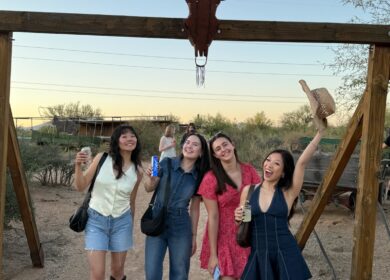
By Samantha Tan, Account Executive
There’s a saying, “Talk less and listen more.” And in the communications industry, we are often evaluated by our ability to speak and write, but any expert communicator will tell you that listening is just as important. In fact, some might even argue that listening can be more valuable than speaking. When we’re able to silence all distractions to listen — and we mean really listen — people feel valued and cared for, which in turn fosters trust and openness.
Our sixth value, We Listen, holds importance for everyone, especially the senior folks in the agency, who strive to truly listen to the views of others.
Let’s dive into what listening means to our Hoffmanites.
Chris Owen, UK Director (EU)
‘Listening’ is very different to ‘hearing’. The former indicates an understanding and an expectation of acting upon it, whereas ‘hearing’ is simply the way you listen. Too often these are synonymous, and in our industry we have to listen and not just hear. This applies across the board, from how we behave with our clients as people and as companies — we need to listen through every nuance. Listening is also what gives us the insight that defines and unearths the stories we’re constantly looking for and which underpin our work as a company — you can’t find a gem just by hearing, you have to listen for it.
I take listening in a few ways. First, listening to colleagues and always being there for advice, support, and any question, no matter how silly it might seem to the person asking it. If we’re not always here to listen, people won’t say anything as they don’t think we’re listening, and this just means we close off from each other. Second, listening to clients when they talk about the business — what do they really mean and what’s behind the discussions we’re having. And third, listening to the market and to media — what noises are being made in the sectors our clients operate within? And what does this tell us about how we can insert our clients into these discussions? Listening carefully to snippets which might hide bigger ideas, stories, and creative opportunities. If we’re not tuned in and listening, we won’t spot the gem waiting to be uncovered. As our motto goes, “The story is always there.”
Hayley Hendrickson, Account Coordinator (U.S.)
To me, listening is perhaps the most important value we uphold as communicators. Whether it’s listening to our peers or a client, listening is the cornerstone of just about everything we do here at Hoffman. Listening is often undervalued in the communications industry as the emphasis tends to be placed on one’s ability to speak or write. But to do either of those things well, one must listen first.
Listening is fundamental to Hoffman’s success and goes hand in hand with trust. As a speaker, there is a certain amount of vulnerability that comes with the task of sharing a viewpoint. As a listener, one must actually hear what the speaker is saying in order to build a foundation of trust. At Hoffman, there is no bias in the process of listening to others’ perspectives. Everyone’s perspective deserves to be heard, from intern to CEO. I learned early on as an intern that my voice brings value to my teams. I listen to my team members every day as they provide feedback, and in team meetings, every member’s voice is heard at all levels. But listening is also about asking questions. To learn and improve, one must engage by asking questions and listening to the insights provided.
Maureen Tseng, General Manager (APAC)
Listening is a central tenet to good communications and in our line of work, a critical component to providing strong client counsel. Clients often come to us with problems, and if we listen well, we can pick up what they really need and address their needs effectively. I’ve been with the agency for a long time, and our strong culture is a common theme that is brought up again and again. Listening is an intrinsic element of that culture, and it permeates all levels. We don’t just give lip service when opinions are shared — there is a constant feedback loop, and we try to take action wherever possible. What makes this agency so special is that the management actively promotes a culture of listening. So much so that even the most junior team member gets heard if they have something to share.
Being a good listener is something that I am constantly working on every single day — whether at home, among friends or at the workplace. Truly listening and taking on board another person’s viewpoints is incredibly affirming; there are so many advantages. Listening demonstrates that you value the other’s inputs and opinions — it signals respect. At the same time, it helps clarify points, address misconceptions and even challenge assumptions. Moreover, I try to make an effort to reach out and connect with my clients, team and colleagues across the globe on a regular basis. Listening to a diversity of views is enriching and creates a safe learning environment as well. Some of our most innovative campaigns and initiatives have come from an amalgamation of views across teams and geographies.
Rachel Nicolas, Account Executive (U.S.)
Listening means to understand what the client’s needs and asks are; once that’s determined, the next step is listening to respond, making sure we give the best recommendations. As far as agency culture, this means creating a comfortable environment where everyone can speak their mind because they know others are listening instead of being dismissive. So, whether it’s the account manager, a colleague or even an intern, everyone is heard. I think that’s part of what makes Hoffman so successful — no one’s ideas are too little, and teams are always collaborating ideas to ensure the client’s goals are met.
Working with tech clients can be tricky sometimes, so I’m always listening to make sure I’m comprehending what they’re saying versus what they actually mean and listening between the lines. For example, sometimes a client is ready to release a new product but doesn’t provide further actions. From the few details given, I know they expect pitch targets, angles, coverage, social posts to accompany the announcement, a timeline, etc.
Frank Zhang, Deputy General Manager (APAC)
Fostering a strong listening work culture starts with the leaders. At Hoffman, the global leadership team listens to employees so that they can create a workplace that meets everyone’s needs and is successful. For account work, listening is not only hearing what clients say, but also being empathetic and setting aside own self-interests to identify the client’s problems, wants or needs. I think it’s crucial for every person to be able to collaborate in their daily lives, and not just at work. With that being said, I think understanding how to listen, and not just talk, is probably the most important part in collaboration. It shows that you genuinely care what about others and their opinions, and thus enable others to feel valued.
Cecilia Zhong, Account Manager (U.S.)
I believe listening is crucial to any meaningful communication. Without listening, a “dialogue” is just a monologue in turns. Listening is absolutely fundamental to our success. Active listening enables us to become more empathetic to our clients’ needs and more supportive for our teammates, which contributes to more effective problem-solving and a more collaborative team environment. For example, before proposing a solution or jumping into a conclusion, I try to make sure I’ve listened to what everyone else has to say.
Jia Shi, Associate Director (APAC)
Listening is essential to all kinds of communication, and good listening skills are essential for workplace success. Strong listening skills can improve team chemistry, and team chemistry is the essence to move things forward. As a PR consultant, I need to listen to a client’s brief to implement a successful integrated marketing communications (IMC) plan. As a team leader, I need to listen to my team’s thoughts to motivate them to achieve better performance. Beyond that, I think all members of my teams are very good listeners. We love to listen to each other to share happiness, solve difficulties and increase productivity.

